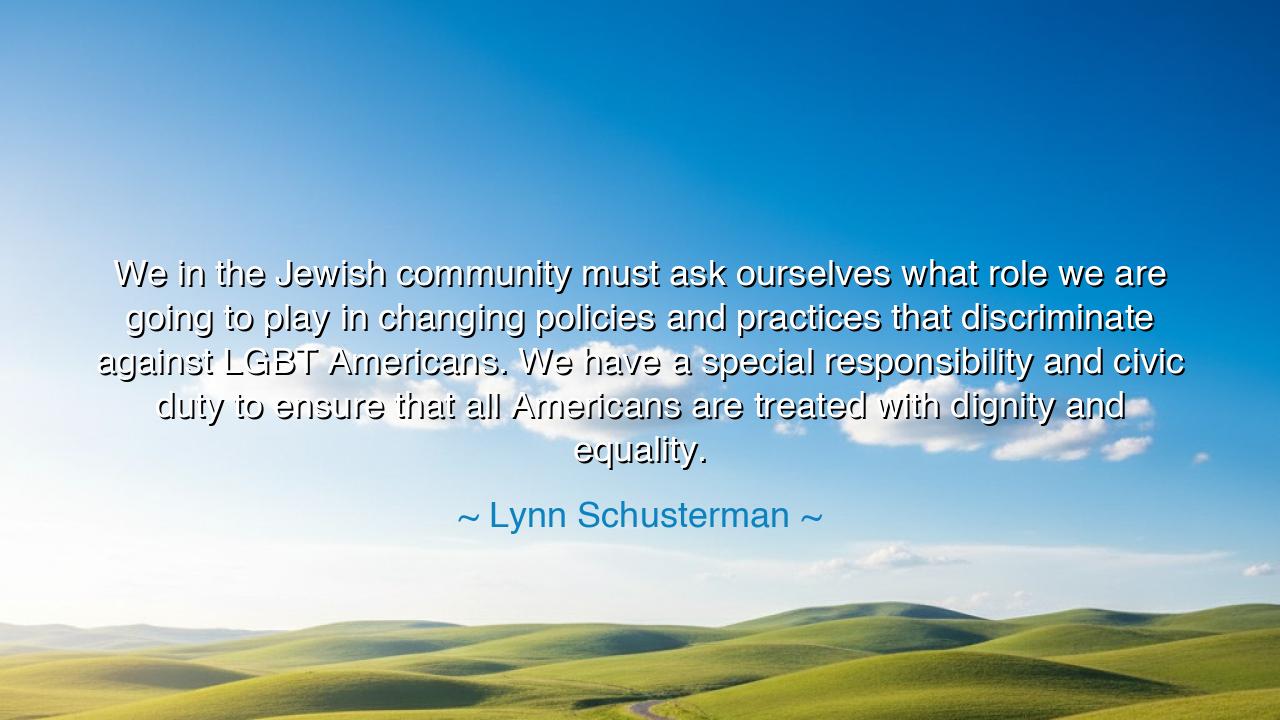
We in the Jewish community must ask ourselves what role we are
We in the Jewish community must ask ourselves what role we are going to play in changing policies and practices that discriminate against LGBT Americans. We have a special responsibility and civic duty to ensure that all Americans are treated with dignity and equality.






Hear now, O children of faith and justice, the words of Lynn Schusterman, a woman whose spirit burns with the fire of compassion: “We in the Jewish community must ask ourselves what role we are going to play in changing policies and practices that discriminate against LGBT Americans. We have a special responsibility and civic duty to ensure that all Americans are treated with dignity and equality.” These words, though born of a modern age, carry the timeless cadence of prophecy — a call to conscience, a reminder that faith divorced from justice is but an empty echo.
In her declaration, Schusterman summons her people — and all people of belief — to awaken to their sacred duty. She speaks as one who understands that true faith is not measured in words or rituals alone, but in action: in how we stand beside the oppressed, how we defend those whom society has cast aside. Her command is not gentle; it is urgent. “We must ask ourselves,” she says — for every generation must look into its own heart and decide whether it will be the voice of compassion or the silence of complicity. Discrimination against LGBT Americans, she reminds us, is not merely a political issue; it is a moral failing, a wound upon the soul of the nation.
The origin of her conviction lies deep within the Jewish tradition itself, whose prophets and sages have always called their people to righteousness and mercy. From the ancient words of the Torah — “You shall love your neighbor as yourself” — to the cries of Isaiah and Amos demanding justice for the downtrodden, the heart of Jewish teaching beats with a universal truth: that every human being is made in the image of God, and thus possesses an unbreakable dignity. To deny equality to another, then, is to deny the divine spark within them. Schusterman’s call is not new; it is the renewal of an eternal covenant — that faith and fairness must walk hand in hand.
Consider the story of Abraham Joshua Heschel, the great rabbi who marched beside Martin Luther King Jr. in the American civil rights movement. When asked why a man of faith should join a march for social justice, Heschel replied, “I felt my legs were praying.” His steps upon the road to Selma were a living sermon, proclaiming that holiness is not confined to temples or texts but is found in the struggle for human dignity. So too does Lynn Schusterman call her community — and all communities of faith — to take up that same sacred march, this time for LGBT equality. For she sees, as Heschel did, that silence in the face of injustice is itself a sin.
Her words are also a reminder of history’s burden. The Jewish people, who have known exile, persecution, and genocide, understand in their bones what it means to be hated for being different. From the Pharaohs of Egypt to the tyrants of the twentieth century, their suffering has been the price of being “other.” Thus, when Schusterman speaks of a “special responsibility,” she invokes that long memory — the duty born of pain to ensure that no one else endures what her ancestors endured. To stand idly by while another group suffers discrimination would be to betray the very essence of Jewish identity, which is rooted in empathy and moral courage.
And yet, her message extends beyond one faith. It is a summons to all who believe in the divine potential of humanity. To defend the dignity of LGBT Americans is not to abandon faith, but to fulfill it — for love and acceptance are the highest forms of worship. She urges that the civic duty of every believer is to transform faith into justice, compassion into policy, and belief into inclusion. To pray for a better world is good; to build it with one’s hands is holier still.
Therefore, O listeners, take this teaching to heart: that equality is not a gift to be granted, but a right to be recognized; that dignity is not earned through conformity, but bestowed through existence itself. Let every person of faith examine their conscience and ask: “What is my role in the healing of the world?” For it is not enough to reject hatred in words; one must also confront it in deeds. Speak out when prejudice rises, comfort those who suffer, and challenge every law and custom that diminishes another’s humanity.
And so, as Lynn Schusterman reminds us, faith must never be a refuge for the comfortable but a refuge for the excluded. The true mark of holiness is how we treat the most vulnerable among us. Let the synagogues, churches, mosques, and temples of the world become sanctuaries not only for worship, but for welcome. Let every heart become a place where inclusivity, justice, and equality dwell together. For in lifting others to dignity, we rise closer to the divine ourselves — and fulfill the ancient promise that one day, all humankind shall live as one people, equal in worth, and radiant in love.






AAdministratorAdministrator
Welcome, honored guests. Please leave a comment, we will respond soon